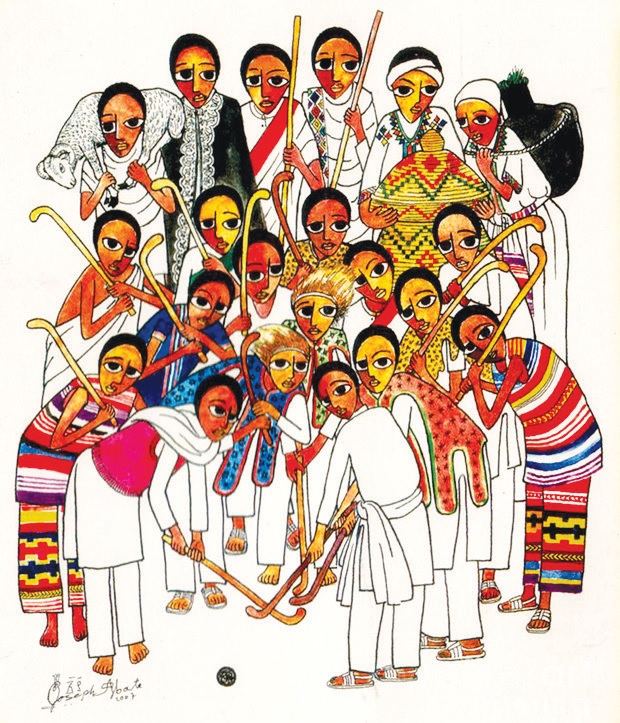
BY MENGISTEAB TESHOME
January 7th, is the day when the historically Ethiopian Christmas has been celebrated and Ethiopians are not the only ones who do so. Russian orthodox and other orthodox celebrate Christmas on January 7.
Christmas, which is celebrated on the 7th January, is called Ledet or Genna which comes from the word Genna, meaning “imminent” and which expresses the coming of the Lord and the freeing of mankind from sin. While the Gregorian calendar celebrates Christmas on the 25th of December, Ethiopia still retains the ancient Julian calendar in which Christmas falls on January 7th (of the Gregorian calendar.) Genna is also the name given to a hockey-like ball game. Legend has it that when shepherds heard of the birth of Christ they rejoiced and started playing the game with their sticks.
Men and boys in villages now play the traditional Genna game, Ethiopian Hockey with great enthusiasm in the late afternoon of Christmas day, a spectacle much enjoyed by village communities and the elders play the part of a referee in the game.
The celebration of Ethiopian Christmas is marked by various activities such as horse racing and authentic folk dancing. At Lalibela, Genna is celebrated in a very attractive ways due to the birth date of King Lalibela being on a similar day.
In the rural areas a popular game which looks like European Hockey but is typically Ethiopian is conducted between two youth teams. The game is named after the festival and is called “Yegena Chewata”. Genna festivities begin early in the
day, as early as 6:00 am when people gather in churches for mass. For the clergy it has begun much earlier, 43 days before, with the fasting period leading up to Genna. This pensive fasting period is required of the clergy and is known as the fast of the prophets. The fast of Advent is carried out to cleanse the body and soul in preparation for the day of the birth of Christ.
Although Genna is observed by Christians across Ethiopia, the most famous Christmas celebrations arguably occur in the historic city of Lalibela. There, crowds of up to 100,000 pilgrims flock to watch immaculately dressed Orthodox clergy perform the woreb lining the steep ledges surrounding the famous rock-hewn churches carved over 800 years ago.
Accompanied by a slowly building tempo of traditional church drums, metallic sistrum and pilgrims’ clapping, they lead the crowd in an intensely moving musical performance about the birth of Jesus Christ.
For though its execution may look different here than in other parts of the world, the focus of Ethiopian Christmas remains the same: to celebrate the birth of a Savior who came to take away the sins of the world, and to bring peace to all mankind.
Everyone stands throughout the worship service for up to three hours. The clergy and Debtera (scholars versed in the liturgy and music of the church) lift their voices in hymn and chant just as it has been for over a 1,500 years when Ethiopia accepted Christianity.
This ancient rite culminates in the spectacular procession of the Tabot (the Tabot is symbolic of the Ark of the Covenant) and carried on top of a priest’s head).
The procession makes its way three times around the church amidst ululation and chiming church bells, dazzling umbrellas and colorful attire of the clergy and a throng of Christians who follow the procession with lighted candles.
Afterwards, people disperse to their homes to feast and the clergy break their fast. Food served at Christmas includes Doro Wat and Injera, a spicy chicken stew eaten with the sourdough pancake-like bread. Often, tej, a local wine-like drink made from honey, accompanies the feast.
Christmas is quietly shared and celebrated in groups of friends and family. Gift giving is a very small part of Christmas festivities in Ethiopia. Only small gifts are exchanged amongst family and friends at home.
The joy of giving and sharing extends beyond religious beliefs and spreads the spirit of peace on earth and goodwill to all mankind throughout the world.
The Ethiopian Herald January 7/2021





